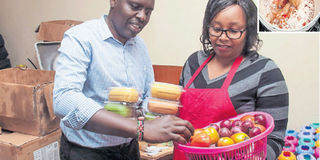Show me onions, I’ll make you soap

Martha Muriu and her husband Robert display ingredients including onions that they use to manufacture soap and (inset) the ingredients mixed in the process of soap-making. The beauty soaps, according to Martha, have many skin benefits that include curbing acne and rashes. PHOTOS | JOSEPH KANYI | NMG
What you need to know:
- Being an onion farmer in her rural home in Kiawara, Nyeri, Martha’s optimism in succeeding in the sector was often dashed by perennial decline in market prices of the produce to sometimes less that Sh40 a kilo.
- To make bathing soap, she begins by slicing onions or cucumbers or both into pieces and adding them into a mixture of water and seven chemicals that are used in making the product.
- On average, using a 20-litre bucket, they produce 45 pieces of bathing soap while similar quantity will produce 10 pieces of bar soap. The beauty soaps, according to Martha, have many skin benefits that include curbing acne and rashes.
- The couple is in the process of certifying their products with the Kenya Bureau of Standards as they seek to sell them in formal outlets.
Onions, turmeric, cucumbers and tomatoes, when added to meat or vegetables, give one a finger-licking meal.
Well, now imagine how refreshing it can be showering using soap blended with your favourite spice.
This is the experience Martha Muriu and her husband Robert, who live in South B, Nairobi, are giving people as they use various horticultural products to make soap.
Being an onion farmer in her rural home in Kiawara, Nyeri, Martha’s optimism in succeeding in the sector was often dashed by perennial decline in market prices of the produce to sometimes less that Sh40 a kilo.
She, thus, chose to do things differently. Her favourite and easy pick was onions.
“It has been a journey of trial and error that began almost a year ago, and I just perfected it two months ago. I have now added the other crops like cucumbers and oranges,” says Martha, who has been in business for years.
To make bathing soap, she begins by slicing onions or cucumbers or both into pieces and adding them into a mixture of water and seven chemicals that are used in making the product.
“The chemicals include those that prevent allergies, sunburns, hardening of the soap making it shiny and preservatives that will make it have a longer shelf-life. We then add oil and colour,” Martha explains, adding the mixture is then stirred, sieved and left to settle.
BENEFITS TO THE SKIN
Thereafter, the couple then fills the solution in plastic dishes customised to hold it for hardening. The soap is then packed in nylon packs branded Crystal.
On average, using a 20-litre bucket, they produce 45 pieces of bathing soap while similar quantity will produce 10 pieces of bar soap. The beauty soaps, according to Martha, have many skin benefits that include curbing acne and rashes.
“Cucumber is recommended for people with dry skin since it contains a high percentage of water,” she says, adding that the plant has various antioxidant agents good for the skin.
The sell a piece of soap weighing 450g at Sh70. “The demand for the soap has been growing steadily that we sell up to 1,000 pieces a month. A majority of our customers are referrals from people who have tried it,” Robert says, noting value addition helps cushion farmers from losses occasioned by poor prices or glut.
The couple is in the process of certifying their products with the Kenya Bureau of Standards as they seek to sell them in formal outlets.
John Wambugu, an agronomist at the Wambugu Farm in Nyeri, says when doing value addition, including making soap, hygiene is paramount.
“Value addition for such products offers untapped opportunities. One should also ensure they meet all the standards such that their products do not pose a health risk to consumers,” he says.





